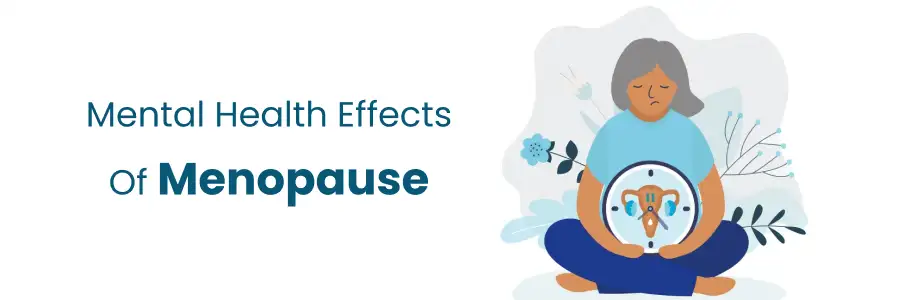- Cardiology 84
- Dermatology 45
- Endocrinology 33
- ENT 16
- Fertility 190
- Gastroenterology 78
- General-Medicine 81
- Gynecology 80
- Hematology 19
- Infectious-Diseases 33
- Neurology 52
- Oncology 34
- Ophthalmology 23
- Orthopedics 69
- Pediatrics 31
- Procedure 23
- Public-Health 144
- Pulmonology 59
- Radiology 8
- Urology 68
- Wellness 161
- Woman-and-child 77

How Does Menopause Affect Your Mental Health
Menopause is a natural part of aging for women, typically occurring between the ages of 45 and 55. While much attention is given to the physical changes, the mental health effects of menopause are equally important. This article explores how menopause can impact your mental health, the symptoms to watch out for, and strategies to maintain emotional well-being during this transitional period.
Secure your health with a second opinion. Make informed decisions and book your appointment today!
Get A Second OpinionUnderstanding Menopause
Menopause marks the end of a woman's menstrual cycles and is diagnosed after 12 months without a menstrual period. The transition leading up to menopause, known as perimenopause, can last several years and is characterized by fluctuating hormone levels.
Hormonal Changes
The primary hormones affected during menopause are estrogen and progesterone. These hormones play a significant role in regulating mood, sleep, and overall mental health. Their decline can lead to various mental health symptoms.
Common Symptoms
Menopause symptoms vary widely, but some common ones include:
- Hot flashes
- Night sweats
- Irregular periods
- Vaginal dryness
- Sleep disturbances
While these symptoms are physical, they can also have a profound impact on mental health.
Mental Health During Menopause
Mood Swings
One of the most common mental health issues during menopause is mood swings. Women may experience sudden and intense shifts in mood, ranging from irritability and anger to sadness and anxiety. These mood changes can be attributed to fluctuating hormone levels.
Anxiety and Depression
Anxiety and depression are also prevalent during menopause. Hormonal changes can affect neurotransmitters in the brain, such as serotonin and dopamine, which regulate mood. This can lead to feelings of anxiety, sadness, and even clinical depression.
Cognitive Changes
Menopause can also impact cognitive functions. Some women report experiencing "brain fog," which includes difficulties with concentration, memory lapses, and trouble focusing. These mental changes can be frustrating and affect daily life.
Sleep Disturbances
Sleep problems are common during menopause, often due to night sweats and hot flashes. Poor sleep can exacerbate mental health issues, leading to increased irritability, anxiety, and depression.
The Psychological Impact of Menopause
Self-Esteem and Body Image
The physical changes that accompany menopause can affect self-esteem and body image. Weight gain, changes in skin elasticity, and hair thinning can lead to negative self-perception and lower self-confidence.
Social and Emotional Well-being
Menopause can also impact social and emotional well-being. Women may feel isolated or misunderstood, leading to feelings of loneliness. The emotional toll of menopause can strain relationships with partners, family, and friends.
Coping Strategies for Mental Health During Menopause
Seek Professional Help
If you're experiencing severe mental health symptoms, it's essential to seek professional help. A healthcare provider can offer treatments such as hormone replacement therapy (HRT), antidepressants, or counseling to help manage symptoms.
Lifestyle Changes
Making lifestyle changes can also improve mental health during menopause. Regular exercise, a balanced diet, and adequate sleep can have a positive impact on mood and overall well-being.
Mindfulness and Relaxation Techniques
Practicing mindfulness and relaxation techniques, such as meditation, yoga, and deep breathing exercises, can help reduce stress and improve mental clarity.
Stay Connected
Maintaining social connections is crucial for emotional well-being. Engage in activities that bring you joy and connect with friends and family. Support groups for women going through menopause can also provide a sense of community and understanding.
Educate Yourself
Understanding what to expect during menopause can help you feel more in control. Educate yourself about the mental and physical changes, and don't hesitate to ask your healthcare provider for information and support.
Ready to take control of your health journey? Book your appointment now and start your path towards wellness today!
Book an AppointmentConclusion
Menopause is a significant life transition that can have a profound impact on mental health. By understanding the mental health effects of menopause and implementing coping strategies, you can navigate this period with greater ease and maintain emotional well-being. Remember, it's essential to seek professional help if you're struggling with severe symptoms, and to stay connected with your support network.
Menopause is a natural phase of life, and with the proper support and self-care, you can manage its challenges and continue to thrive.
Frequently Asked Questions
Menopause can affect mental health by causing mood swings, anxiety, and depression due to hormonal changes.
Menopause affects mental health through changes in mood, increased stress, and potential development of anxiety or depression.
Symptoms include mood swings, irritability, anxiety, and depression.
Menopause can significantly impact emotional wellbeing, often leading to feelings of sadness and increased emotional stress.
Changes can manifest as increased anxiety, depression, and mood swings, often requiring professional support.

- Cardiology 2132
- Dermatology 168
- Endocrinology 135
- ENT 97
- Fertility 217
- Gastroenterology 232
- General 478
- General-Medicine 1685
- Gynecology 169
- Hematology 85
- Infectious-Diseases 208
- Neurology 207
- Oncology 345
- Ophthalmology 65
- Orthopedics 187
- Pediatrics 83
- Procedure 72
- Public-Health 209
- Pulmonology 126
- Radiology 13
- Second Opinion 311
- Urology 294
- Wellness 600
- Woman-and-child 447
- Others 10217
Related Blogs
If you have any questions, please fill out the enquiry form or call us, and we will get back to you promptly.
040-68334455